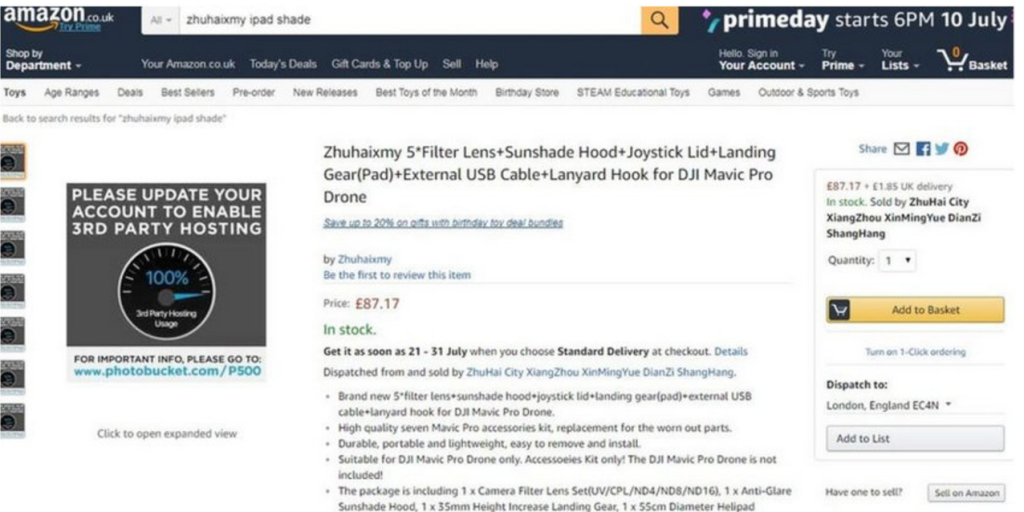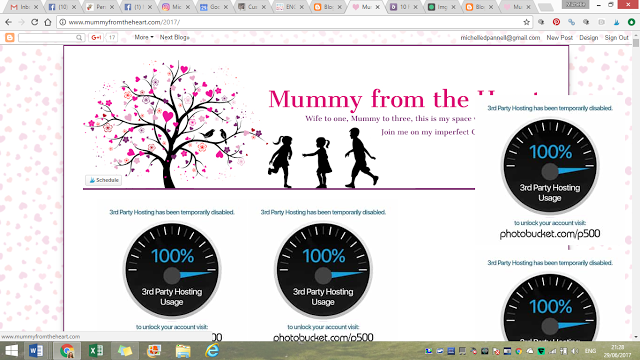
Thousands of images promoting items sold on Amazon, Ebay, Etsy amongst other shopping sites have been removed after the photo-sharing third party service provided by Photobucket changed its terms and services.
Not only has this caused issues on the shopping e-commerce sites, but it has caused social media outrage on sites like Facebook and Twitter as they find that many forums and blogs have all the images replaced with what many have described as a Ransom attack if they want to continue using their services. The problem has been caused when Photobucket introduced a steep charge for allowing images to be hosted on its platform when embedded into third-party sites.

Above shows how the new Photobucket change of terms and services have affected big multinational companies like Amazon, Ebay and Etsy to name just a few.
The Image hosting site Photobucket is facing a whole host of backlash due to this decision as they have caught many internet users unaware with the changes that have took place. To make matters worse users cannot simply pay or upgrade to one of Photobucket’s standard plans, with a reasonable price of $6 a month or its $40 monthly fee, Instead, the only option is an unaffordable fee of £309 for a annual subscription for the Plus500 plan, which is the only plan that allows third-party hosting.
Photobucket has been online since 2003 and has more than 100 million customers and as a result have allowed the sharing of an impressive 15 billion images across its servers which is why this sudden change is causing so much controversy and chaos amongst the internet.
Part of its attraction with the small retailers was the fact that its ad-supported free accounts could be used to upload images of goods to a single destination from where they could be pushed to multiple outlets. With this service now being stopped Photobucket could find themselves out of business!
Many users only realised the change when their embedded images were replaced by unattractive graphics saying their Photobucket accounts needed to be updated. It was only on 26th of June when the company published a short -almost invisible- notice telling users to “take a moment to review their updated terms and policies”. In these new terms and services in about 500 words they state that free accounts will no longer permit image-linking to third-party sites.

Above shows an example of what free Photobucket users woke up to, when all their images have been replaced requiring them to upgrade or use another service.
Some sellers unwilling to pay the fee have handled the change by uploading their product photos to a rival service. For example, a small Devon-based seller who owns a vintage store called ‘Retro 2 Go’, which sells many of its products on eBay, was one of those customers that were affected by the changes of terms and service. The store’s owner Gigha Klinkenborg said to the BBC that he now has an increased workload and plenty of editing to do. He also said “A bit of notice would not have been unreasonable to expect” as even if every user had seen the change to the terms and services, they had less than a week to respond. “I have deleted my accounts and would not use Photobucket again.” he went on to say.
The new policy has also affected historical social media posts, blogs and forums that were once, and many still are reliant on Photobucket for distributing images. One of those forums affected by the change is Stampboard, a forum with more than 17,000 user who discuss postage stamps and share images of them. Many of its pages are now filled with Photobucket’s upgrade ransom demands instead of the photos of stamps it once showed. Glen Stephens, one of the site’s administrator said that “They are holding users to ransom and advised its members to not pay the fee as “You have no guarantee they will be in business… in a month the way this disaster is rolling out”. Because of this decision thousands of Bulletin boards across the globe are being crippled as previously vibrant threads with detailed images now disappearing.

Above shows the state of many forums today due to Photobucket’s changes of terms and services.
Runcorn’s Aqueous Digital have defended Photobucket in wanting to become less reliant on ads, but criticised the service for both the shocking sums of money it was seeking from its customers and the sudden way it has implemented the changes as “It came out of the blue,” and “there were no announcements, no emails warning people that it was about to happen and more importantly, no explanation”.
People who have used Photobucket for hosting these images successfully for over 10 year without paying the annual yearly fee will have to pay £309 or they will have to literally start again with what for many, amounts to a lifetime’s work!
However, Nigel Atherton, the editor of Amateur Photographer magazine, said the public needs to be aware of the risks of relying on any free image services saying that “there’s a lot of websites out there looking for advertising, and there’s a finite amount of advertising spending to go round”. Any photo gallery and storage site like this that relies on ads to offer a free service can only continue to do so if they have enough money coming in. The servers necessary for hosting don’t pay for themselves after all!
Therefore there is a risk of putting photos on any app like PhotoBucket where it is unclear how they are going to continue financing their business. As a result this has come back to bite many of it’s users. If anything can be learned from this, it is that if you are using a free 3rd party hosting, there will come a time when the company ceases to exist or requires more money, and these images that they host don’t just pay for themselves. Whatever service you use on the internet, it requires servers, resources and skilled engineers in the background that many of us take for granted. Therefore, as a user of the internet, it is important to realise that everything you use on the internet comes at a cost, and more often than not, it is the customers that use the services that end up doing the paying in the long run!





